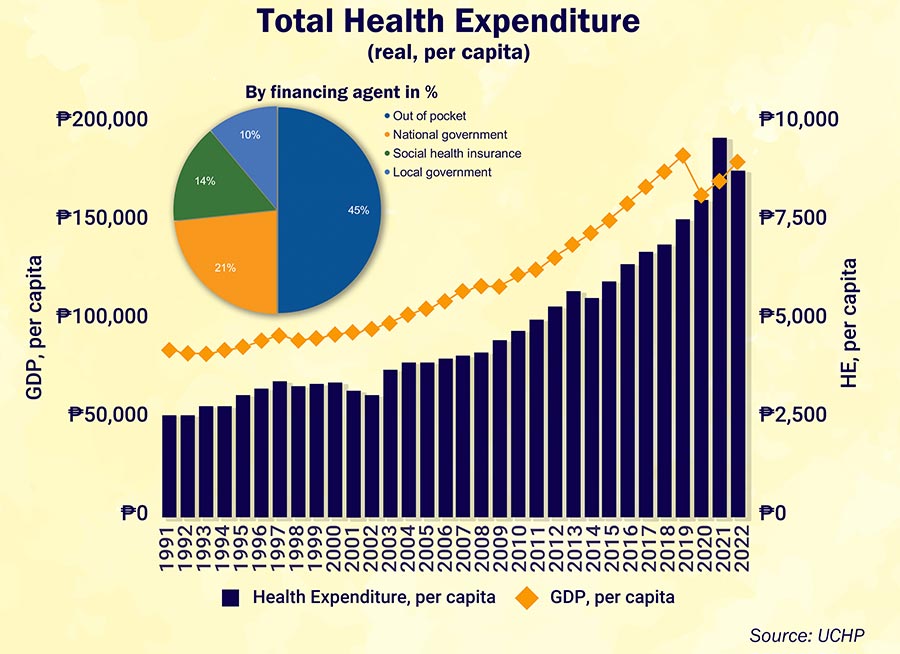By Victor Reyes
DEFENSE Secretary Gilberto Teodoro Jr and visiting German Defense Minister Boris Pistorius yesterday opposed any “expansive claims” amid China’s continuing aggressive behavior in the West Philippine Sea in the South China.
Teodoro and Pistorius issued a joint statement after meeting in Makati City, during which they discussed “trends in the security environment” and exchanged views on regional issues in the Indo-Pacific and Eastern Europe.
The joint statement also said the Philippines and Germany have committed to concluding a broader defense cooperation arrangement.
Pistorius’ visit is the first by a German defense minister, and a follow-up to the June 3, 2023 meeting between then DND officer-in-charge Carlito Galvez and Pistorius on the sidelines of the 20th International Institute for Strategic Studies Shangri-La Dialogue.
Galvez and Pistorius discussed during their meeting the “prospects for deepening defense cooperation towards the shared goal of upholding peace and stability.”
The meeting between Teodoro and Pistorius coincides with the 70th anniversary of diplomatic relations between the Philippines and Germany, which was formally established in 1954.
The two defense chiefs, in the joint statement, “emphasized the importance of advocating for principled and sustainable peace that is firmly anchored on international law.”
“The ministers strongly opposed any unilateral attempt to advance expansive claims, especially through force or coercion,” the statement said.
The two reaffirmed their countries’ “staunch commitment” to freedom of navigation, overflight, and peaceful uses of the seas consistent with the United Nations Convention on the Law of the Sea (UNCLOS).
They also agreed to continue promoting the “comprehensive implementation” of UNCLOS as the legal framework within which all activities in the oceans and seas must be carried out, and reaffirmed that 2016 decision of the Permanent Court of Arbitration is “final and legally binding.”
The ruling invalidated China’s excessive claims in the South China Sea and affirmed the rights of Philippines to its 200 nautical miles exclusive economic zone.
“The Philippines expressed appreciation for Germany’s steadfast support for international law,” the statement added.
“Recognizing the wide array of opportunities for enhancing bilateral defense relations in light of security challenges that both countries face, the Ministers committed to conclude a broader Arrangement on Defense Cooperation, which will expand the scope of mutually beneficial cooperation between the Philippines and Germany into new areas,” the statement read.
The two sides agreed to enhance bilateral relations between the armed forces of the two nations, including in the field of training.
In a press briefing after the meeting, Pistorius said two German ships are due to visit Manila next month.
Teodoro said the defense department has invited Germany “to participate in maritime cooperative activity (MCA), joint sail or a passing exercise.”
He did not say where the activity might be held. The Philippine Navy held similar MCAs with the United States and Japan in the past months.
On the defense cooperation agreement the Philippines is eyeing with Germany, Teodoro said they are hoping to conclude the agreement “as soon as possible.”
“Hopefully within this year,” he added.
Teodoro said the defense cooperation agreement will center on training and exchange of information. However, he said it was still premature to say if the pact will lead to a type of visiting forces agreement which the Philippines has with the US.
Pistorius said an enhanced cooperation with the Philippines sends a “clear message” that “countries advocating the rules-based international order stand together.”
“And our stance is clear: All countries must be able to enjoy freedom of navigation regardless of their economic strength or geographic size. This is what we stand up for together with our partners. And this is how we can guarantee stability and security,” he said.
Pistorius stressed the 2016 Permanent Court Arbitration is “valid without any exceptions.”
Also, Pistorius said UNCLOS, which provides coastal states such as the Philippines a 200 nautical miles exclusive economic zone, is also valid and “we call on all countries to adhere to it.”
“But we need to do more than stand up for UNCLOS. We need to contribute to de-escalation. This is only possible if we keep all channels of communication open, including those with China,” said Pistorius.
“By participating in the Indo-Pacific deployment, we have followed the rules-based international order,” added Pistorius.
AFP MODERNIZATION
Teodoro said Philippines is looking at Germany as possible source of equipment that will be acquired under the ongoing modernization program of the Armed Forces.
“We will be looking to engage with Germany as a possible supplier of these capabilities.
These are basically in the command and control area, anti-access area deny, maritime domain, aerial domain and in higher technologically capable equipment,” he said.
Teodoro said the acquisition are intended to “protect human rights, particularly the rights to livelihood of Filipino fisherfolk and other Filipino industries who have the exclusive right to explore and exploit the resources of the South China Sea within our exclusive economic zone or what we call the West Philippine Sea.”
“We want to want to uphold the rights of our fisherfolk, workers in the Philippines and the rights of the future generations of Filipinos who have the exclusive right to what is contained in the subsurface of the West Philippine Sea,” he said.
Teodoro stressed it is China that is causing the problem in the West Philippine Sea.
“It is China’s illegal and unilateral attempt to appropriate most, if not all, of the South China Sea as their international waters pursuant to now their 10- dash line on a nebulous and unfounded claim of historical rights,” he said.
He said China is claiming indisputable sovereignty and jurisdiction over these areas, contrary to international law.
“And that is the sole cause of tensions in the South China Sea, to include areas of the West Philippine Sea within the within exclusive economic zone of the Philippines and other claimant countries,” he said.
Teodoro said Philippines is not provoking China, a military superpower.
“We do not seek war, yet we are mandated not only by our Constitution but as an obligation to our countrymen to protect whatever areas whether it be jurisdiction or rights that rightfully belong to the exclusive benefit of Filipinos,” he said.
CHINESE SHIP
The Philippine Coast Guard (PCG) said it is “actively monitoring” a Chinese research vessel that reportedly surveyed a shoal, some 71 nautical miles from mainland Palawan, in the West Philippine Sea.
In a statement on Saturday night, PCG spokesman for the West Philippine Sea Commodore Jay Tarriela said the vessel, Ke Xue San Hao, originated from the Chinese-occupied Mischief Reef or Panganiban Reef.
Tarriela said the vessel left Mischief Reef on July 26 and passed through several “critical locations,” including the Philippine-occupied Ayungin Shoal, before reaching Escoda Shoal.
In May, Philippine officials accused China of conducting small-scale land reclamation activities at the shoal, prompting the deployment of a PCG vessel, BRP Teresa Magbanua, which remains in the area until at present.
The following month, Chinese Navy vessels held naval drills near the shoal amid a marine scientific survey by the University of the Philippines Marine Science Institute.
“As of 4 p.m. today (Saturday), the Philippine Coast Guard has been actively monitoring the multi-purpose oceanographic research vessel Ke Xue San Hao, through the Dark Vessel Detection Program,” said Tarriela.
Tarriela said the vessel has exhibited “irregular AIS (Automatic Identification System) transmissions while navigating in the northern part of Escoda Shoal.”
“Additionally, the BRP Teresa Magbanua has been physically tracking the Chinese research vessel since it passed her dead astern approximately 5.5 nautical miles,” added Tarriela.
The vessel was “challenged” by BRP Teresa Magbanua, he said.
Tarriela said the research vessel was designed by the Marine Design and Research Institute of China and constructed by Wuchang Shipbuilding Industry Co.
“(It is) equipped with advanced technology that enables comprehensive marine environment observation, detection, sampling, and analysis,” said Tarriela.
The presence of the research vessel was reported earlier on Saturday by US maritime expert Ray Powell.
“China’s research vessel Ke Xue San Hao has been surveying the areas south and east of Sabina Shoal since 25 July,” said Powell. It said the vessel came within 40 nautical miles off Palawan last Saturday.
Tarriela also said the PCG has deployed rigid hull inflatable boats (RHIBs) to secure personnel from the Bureau of Aquatic Resources (BFAR), who are distributing fuel assistance to Filipino fishermen at the vicinity of Escoda Shoal.
Tarriela said the RHIBs were deployed from BRP Teresa Magbanua “to provide security, safety, and facilitation assistance during the conduct of this activity.”
He said the deployment was ordered by PCG commandant Adm. Ronnie Gil Gavan, and the order aims to “ensure that Filipino fishermen can access fuel support at offshore fishing grounds without interference from any party, including the Chinese Coast Guard.”
“Currently, the deployed PCG RHIBs are effectively blocking attempts by the Chinese Coast Guard to approach the BFAR vessels, thereby safeguarding the fuel distribution process,” he said without elaborating.














0 Comments